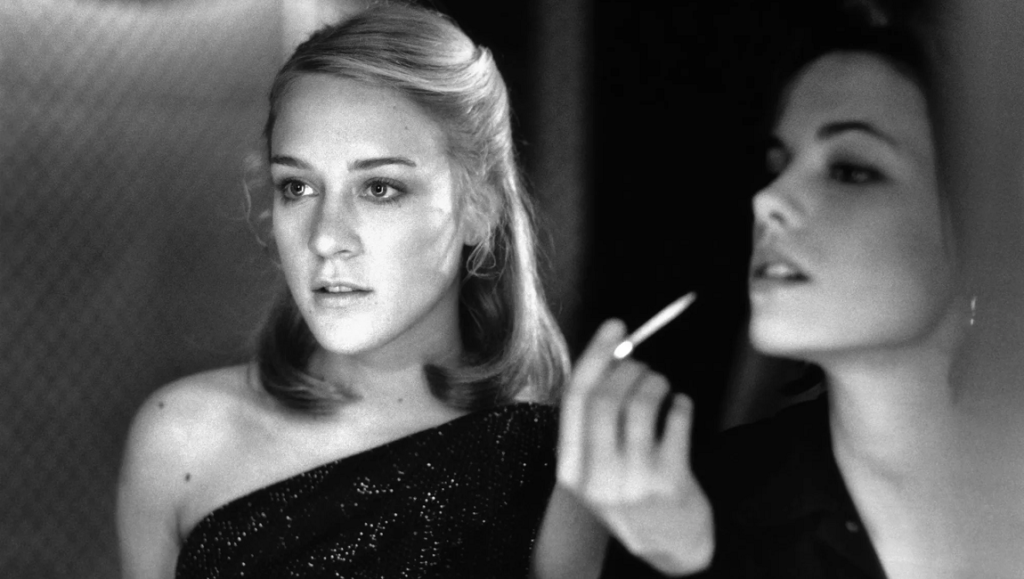“I come from the tail end of that generation in advertising when there was usually an unfinished novelin the lower desk drawer. It was still the glory days of the baby boomers. While we might have sought to fit into society in economically useful or at least minimally remunerative ways, we still refused, at least initially, to let go of our aspirations to accomplish something beyond that, be it artistic or otherwise. Unlike some other people, I do not think our generation was entirely selfish or bad.”
With these typically self-aware and self-deluding lines of narration from the novelization of The Last Days of Disco, the film’s “dancing ad man” character Jimmy Steinway offers an effective summation of the historical, anthropological, and moral focus of Whit Stillman’s 1998 masterpiece. Drawing from the director’s real-life experiences in the New York disco scene of the early ‘80s, the film follows a group of recent college graduates — shy, virginal Alice (Chloe Sevigny), her spectacularly condescending college acquaintance Charlotte (Kate Beckinsale), nightclub manager Des (Chris Eigeman), philosophizing assistant DA Josh (Matt Keeslar), and charming environmental lawyer Tom (Robert Sean Leonard), among others — negotiating their romantic and professional lives. Stillman has said the original title for his movie was History Is Made at Night (a reference to the classic Frank Borzage rom-com), and that one works just as well — for all the pleasures of the film’s romantic roundelays, its grander and darker implications about the unstoppable tide of history are what keep it so fresh and rewarding today, further from the release of the film than the period it depicts.
What strikes one immediately in the film’s bravura, 25-minute opening sequence — in which the main space of the nightclub and the characters populating it are all established — is largely how civilized everything feels. Far from the coke-fueled orgiastic madness we associate (perhaps inaccurately) with the Studio 54 scene, the club seems populated mostly by well-heeled, almost entirely white young professionals; in fact, Jimmy’s employment at the ad firm rests largely on his ability to get his clients inside. Making a disco movie populated entirely by wealthy white people is a risky proposition, and Stillman’s intention isn’t to castigate these characters for colonizing a movement by and for Black, Hispanic, and queer people. Instead, the movie’s sympathetically satiric eye allows us to see for ourselves that the arrival of these types on the scene truly herald its “last days.” Discos had been a space for cultural self-expression among those who had been marginalized out of everywhere else — for Stillman’s characters, the whole appeal is that they can get in and you can’t.
Indeed, if Stillman’s glibly reactionary Twitter responses to the recent civil rights movements have shown anything, it’s that his innate conservatism cannot and should not be extricated from his artistry. Perhaps more than any other recent filmmaker, Stillman fulfills Jean-Luc Godard’s claim that the cinema is a fundamentally 19th-century art. He feels, at times, like The Grand Budapest Hotel’s Gustave H for the 1990s, wistfully chronicling the “faint glimmers of humanity” left behind by the old-world aristocracy well after its time has gone. The Last Days of Disco chronicles a world slipping into barbarism — or Stillman’s version of it, anyway — and simply observes the small, human follies that mark the descent.
But Stillman is too perceptive an artist to fall into solipsism over his subject; his film is constantly poking fun at its characters for their own complicity in their beloved scene’s downfall. Alice and Charlotte work as assistants for a book publisher, and both of them maintain that their only literary ambition is finding a bestseller (Charlotte, of course, would like to work in television). Their colleague, Dan (Matt Ross), points out that the railroad apartment they reluctantly occupy was built for low-income families, and Stillman even takes the time to show Alice (our most sympathetic character) cruelly kicking a dog while jogging through Central Park. Even the nightclub itself, the stage for so much of the film’s action, is engaged in shady business dealings that loom over the action like a disco ball of Damocles. It’s this sense of a disappearing world, of waiting for the other shoe to drop, that gives the movie’s romantic intrigue its essential quality.
The character drama that drives Last Days represents the apotheosis of Stillman’s style — his investigations into the legacy of American aristocracy wouldn’t feel so lived-in or even-handed without Stillman’s perfect conduction of character work. His dialogue is genuinely literary, in that its witticisms serve not only as mere affectation but rather to enrich and complicate characters and their worldview. The movie’s gaze at its young cast is so clear-eyed, as acidic as it is generous, as steadfastly moral as it is guiltlessly pleasurable. It captures so succinctly the eternal youthful longing to belong to something, some community or cultural moment that lives on in the “minds and hearts” (to quote Keeslar’s famous speech at the end of the movie) of those to come that we forgive them for not noticing the larger forces at work until it’s too late. And as great as Keeslar’s speech is, for this writer the movie truly locks into place when we leave the scene following Eigeman and Beckinsale together, two characters who we’ve never considered together and who have hardly interacted but who suddenly seem so perfect for each other, linked visually in one of the many elegant two-shots that signal the “ferocious pairing off” that Beckinsale supposedly despises. The achievement of the film is that this scene, with its mixture of wry melancholy and romantic possibility, can exist side-by-side with the unfettered joy of its finale. In The Last Days of Disco, everything, no matter how personal, how contradictory, or how fleeting, is a part of history.
Part of Kicking the Canon — The Film Canon.
Published as part of InRO Weekly — Volume 1, Issue 3.


Comments are closed.